Business Law Case Study: Contract, Negligence, and Company Law
VerifiedAdded on 2023/04/19
|12
|1860
|490
Case Study
AI Summary
This case study analyzes three key business law scenarios. The first involves a contract dispute between Alex and Bob regarding the sale of an apartment, examining offer, acceptance, and the postal acceptance rule under Singapore law. The second case focuses on negligent misstatement, where Raffles skyscraper building management seeks to recover losses from HBSB Bank due to incorrect financial information provided about a tenant. The analysis explores the duty of care and the tort of negligent misstatement. The final case addresses the rights of George, a shareholder in Abbey Road Pte Ltd, to challenge a resolution passed by other shareholders who are diverting business and breaching their director's duties under the Companies Act. The analysis covers directors' duties, conflict of interest, and shareholder remedies under both common law and statutory law.
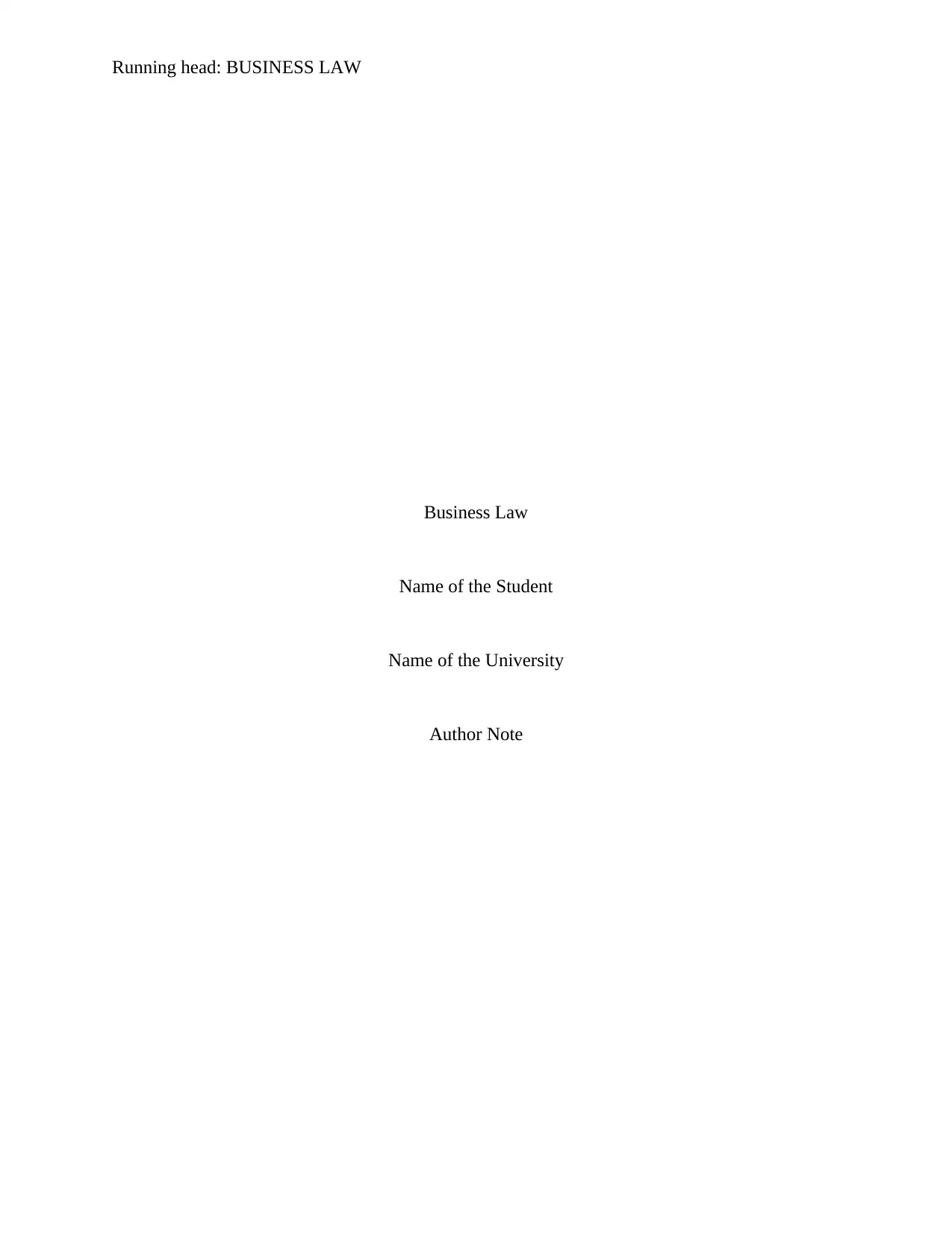
Running head: BUSINESS LAW
Business Law
Name of the Student
Name of the University
Author Note
Business Law
Name of the Student
Name of the University
Author Note
Paraphrase This Document
Need a fresh take? Get an instant paraphrase of this document with our AI Paraphraser
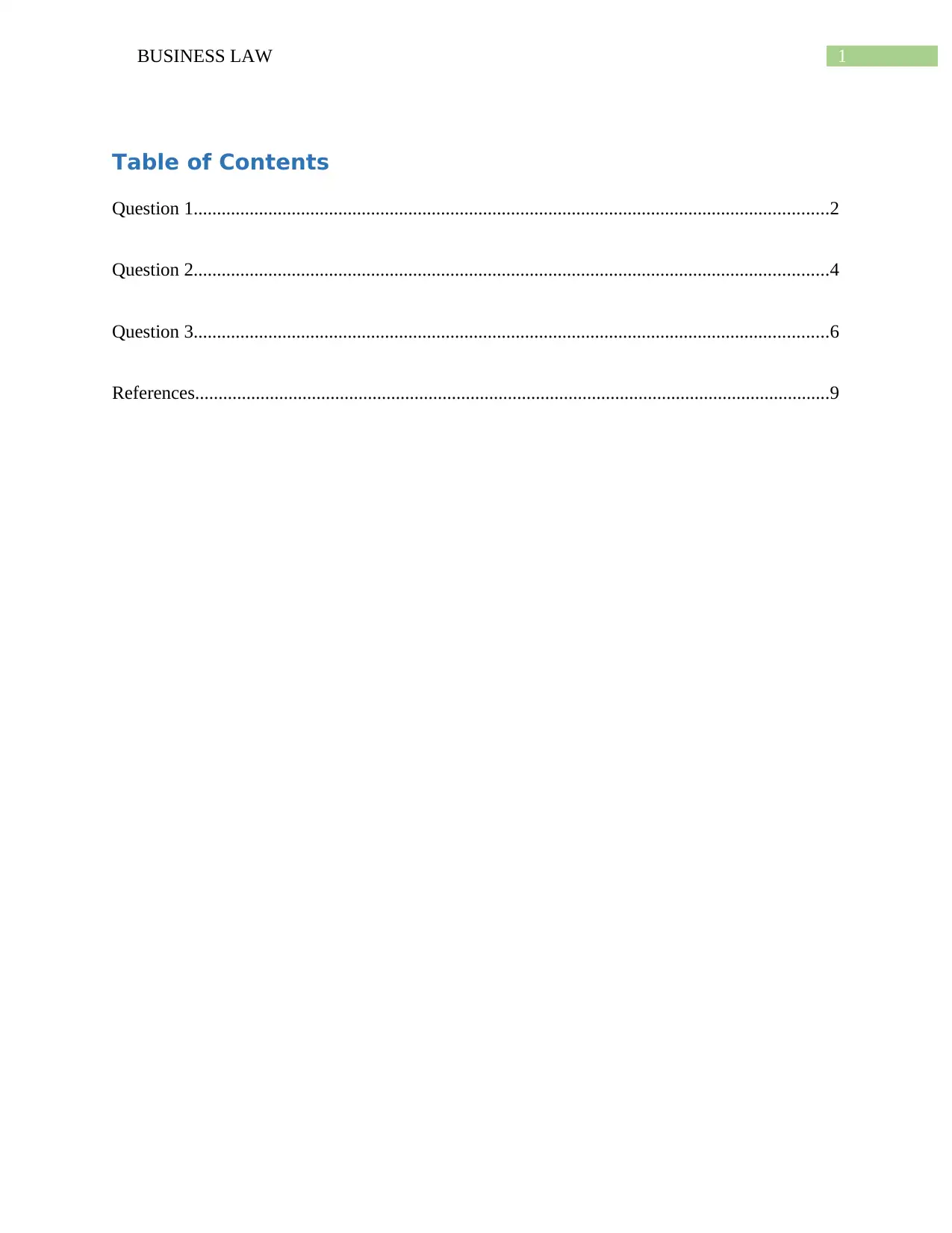
1BUSINESS LAW
Table of Contents
Question 1........................................................................................................................................2
Question 2........................................................................................................................................4
Question 3........................................................................................................................................6
References........................................................................................................................................9
Table of Contents
Question 1........................................................................................................................................2
Question 2........................................................................................................................................4
Question 3........................................................................................................................................6
References........................................................................................................................................9
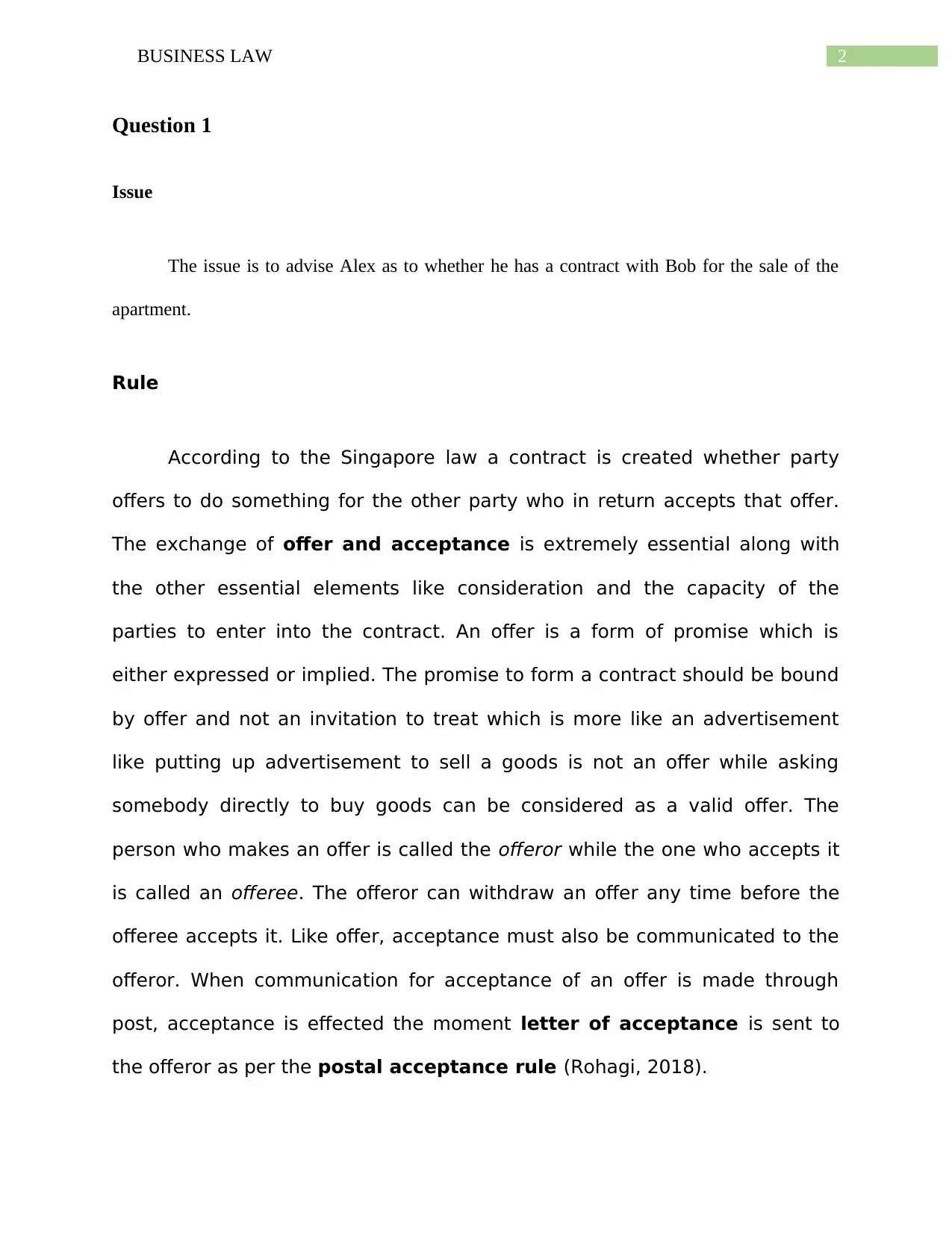
2BUSINESS LAW
Question 1
Issue
The issue is to advise Alex as to whether he has a contract with Bob for the sale of the
apartment.
Rule
According to the Singapore law a contract is created whether party
offers to do something for the other party who in return accepts that offer.
The exchange of offer and acceptance is extremely essential along with
the other essential elements like consideration and the capacity of the
parties to enter into the contract. An offer is a form of promise which is
either expressed or implied. The promise to form a contract should be bound
by offer and not an invitation to treat which is more like an advertisement
like putting up advertisement to sell a goods is not an offer while asking
somebody directly to buy goods can be considered as a valid offer. The
person who makes an offer is called the offeror while the one who accepts it
is called an offeree. The offeror can withdraw an offer any time before the
offeree accepts it. Like offer, acceptance must also be communicated to the
offeror. When communication for acceptance of an offer is made through
post, acceptance is effected the moment letter of acceptance is sent to
the offeror as per the postal acceptance rule (Rohagi, 2018).
Question 1
Issue
The issue is to advise Alex as to whether he has a contract with Bob for the sale of the
apartment.
Rule
According to the Singapore law a contract is created whether party
offers to do something for the other party who in return accepts that offer.
The exchange of offer and acceptance is extremely essential along with
the other essential elements like consideration and the capacity of the
parties to enter into the contract. An offer is a form of promise which is
either expressed or implied. The promise to form a contract should be bound
by offer and not an invitation to treat which is more like an advertisement
like putting up advertisement to sell a goods is not an offer while asking
somebody directly to buy goods can be considered as a valid offer. The
person who makes an offer is called the offeror while the one who accepts it
is called an offeree. The offeror can withdraw an offer any time before the
offeree accepts it. Like offer, acceptance must also be communicated to the
offeror. When communication for acceptance of an offer is made through
post, acceptance is effected the moment letter of acceptance is sent to
the offeror as per the postal acceptance rule (Rohagi, 2018).
⊘ This is a preview!⊘
Do you want full access?
Subscribe today to unlock all pages.

Trusted by 1+ million students worldwide
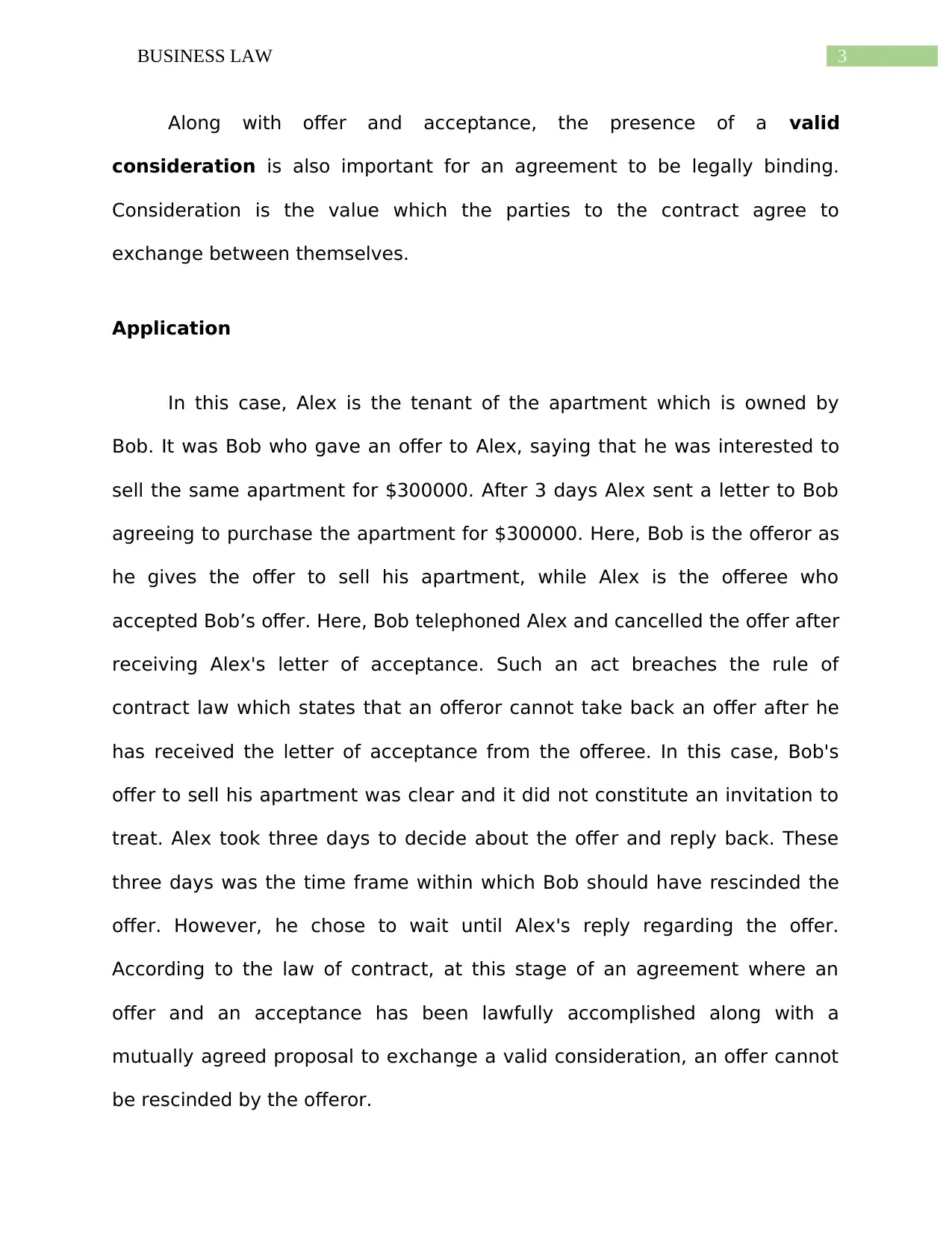
3BUSINESS LAW
Along with offer and acceptance, the presence of a valid
consideration is also important for an agreement to be legally binding.
Consideration is the value which the parties to the contract agree to
exchange between themselves.
Application
In this case, Alex is the tenant of the apartment which is owned by
Bob. It was Bob who gave an offer to Alex, saying that he was interested to
sell the same apartment for $300000. After 3 days Alex sent a letter to Bob
agreeing to purchase the apartment for $300000. Here, Bob is the offeror as
he gives the offer to sell his apartment, while Alex is the offeree who
accepted Bob’s offer. Here, Bob telephoned Alex and cancelled the offer after
receiving Alex's letter of acceptance. Such an act breaches the rule of
contract law which states that an offeror cannot take back an offer after he
has received the letter of acceptance from the offeree. In this case, Bob's
offer to sell his apartment was clear and it did not constitute an invitation to
treat. Alex took three days to decide about the offer and reply back. These
three days was the time frame within which Bob should have rescinded the
offer. However, he chose to wait until Alex's reply regarding the offer.
According to the law of contract, at this stage of an agreement where an
offer and an acceptance has been lawfully accomplished along with a
mutually agreed proposal to exchange a valid consideration, an offer cannot
be rescinded by the offeror.
Along with offer and acceptance, the presence of a valid
consideration is also important for an agreement to be legally binding.
Consideration is the value which the parties to the contract agree to
exchange between themselves.
Application
In this case, Alex is the tenant of the apartment which is owned by
Bob. It was Bob who gave an offer to Alex, saying that he was interested to
sell the same apartment for $300000. After 3 days Alex sent a letter to Bob
agreeing to purchase the apartment for $300000. Here, Bob is the offeror as
he gives the offer to sell his apartment, while Alex is the offeree who
accepted Bob’s offer. Here, Bob telephoned Alex and cancelled the offer after
receiving Alex's letter of acceptance. Such an act breaches the rule of
contract law which states that an offeror cannot take back an offer after he
has received the letter of acceptance from the offeree. In this case, Bob's
offer to sell his apartment was clear and it did not constitute an invitation to
treat. Alex took three days to decide about the offer and reply back. These
three days was the time frame within which Bob should have rescinded the
offer. However, he chose to wait until Alex's reply regarding the offer.
According to the law of contract, at this stage of an agreement where an
offer and an acceptance has been lawfully accomplished along with a
mutually agreed proposal to exchange a valid consideration, an offer cannot
be rescinded by the offeror.
Paraphrase This Document
Need a fresh take? Get an instant paraphrase of this document with our AI Paraphraser
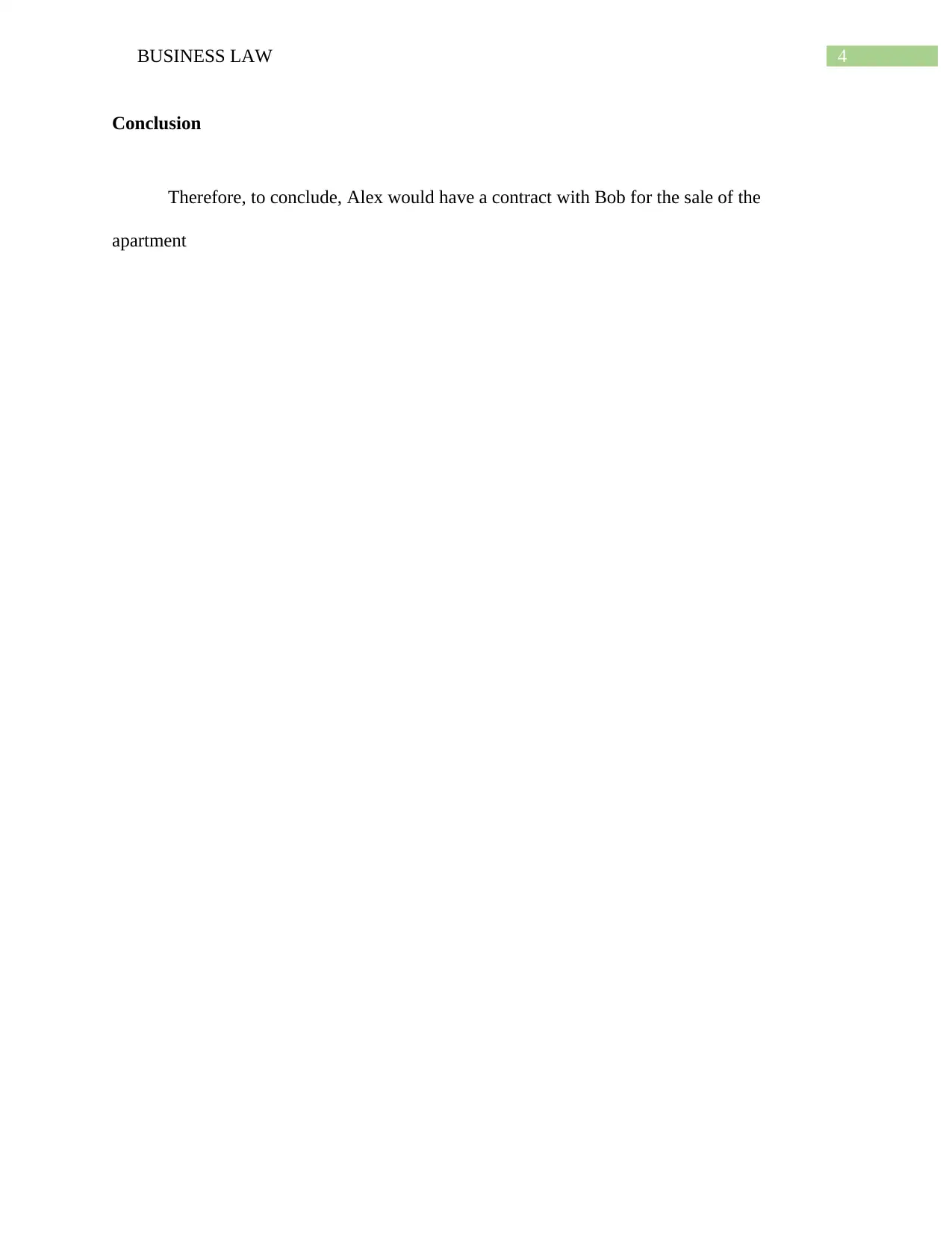
4BUSINESS LAW
Conclusion
Therefore, to conclude, Alex would have a contract with Bob for the sale of the
apartment
Conclusion
Therefore, to conclude, Alex would have a contract with Bob for the sale of the
apartment
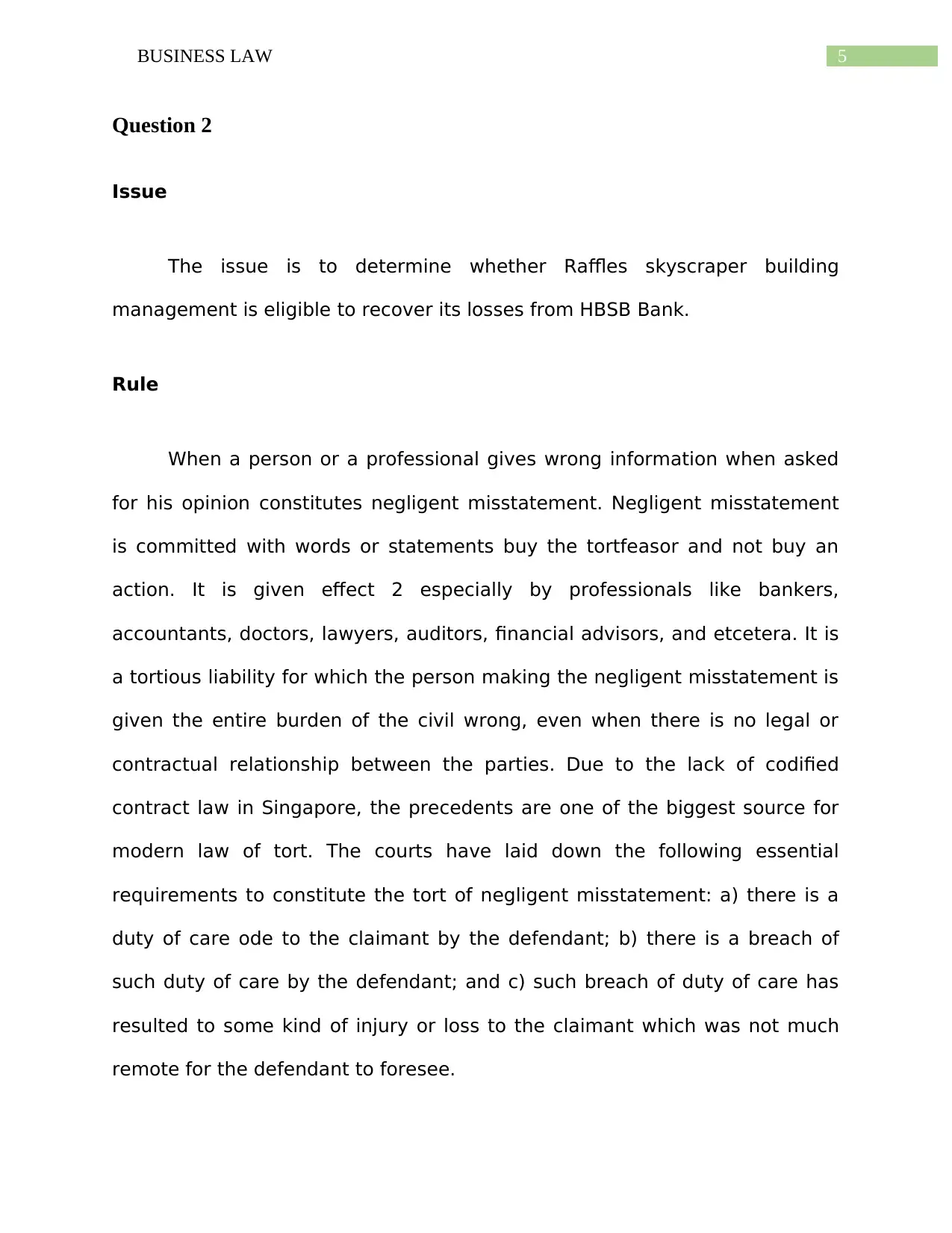
5BUSINESS LAW
Question 2
Issue
The issue is to determine whether Raffles skyscraper building
management is eligible to recover its losses from HBSB Bank.
Rule
When a person or a professional gives wrong information when asked
for his opinion constitutes negligent misstatement. Negligent misstatement
is committed with words or statements buy the tortfeasor and not buy an
action. It is given effect 2 especially by professionals like bankers,
accountants, doctors, lawyers, auditors, financial advisors, and etcetera. It is
a tortious liability for which the person making the negligent misstatement is
given the entire burden of the civil wrong, even when there is no legal or
contractual relationship between the parties. Due to the lack of codified
contract law in Singapore, the precedents are one of the biggest source for
modern law of tort. The courts have laid down the following essential
requirements to constitute the tort of negligent misstatement: a) there is a
duty of care ode to the claimant by the defendant; b) there is a breach of
such duty of care by the defendant; and c) such breach of duty of care has
resulted to some kind of injury or loss to the claimant which was not much
remote for the defendant to foresee.
Question 2
Issue
The issue is to determine whether Raffles skyscraper building
management is eligible to recover its losses from HBSB Bank.
Rule
When a person or a professional gives wrong information when asked
for his opinion constitutes negligent misstatement. Negligent misstatement
is committed with words or statements buy the tortfeasor and not buy an
action. It is given effect 2 especially by professionals like bankers,
accountants, doctors, lawyers, auditors, financial advisors, and etcetera. It is
a tortious liability for which the person making the negligent misstatement is
given the entire burden of the civil wrong, even when there is no legal or
contractual relationship between the parties. Due to the lack of codified
contract law in Singapore, the precedents are one of the biggest source for
modern law of tort. The courts have laid down the following essential
requirements to constitute the tort of negligent misstatement: a) there is a
duty of care ode to the claimant by the defendant; b) there is a breach of
such duty of care by the defendant; and c) such breach of duty of care has
resulted to some kind of injury or loss to the claimant which was not much
remote for the defendant to foresee.
⊘ This is a preview!⊘
Do you want full access?
Subscribe today to unlock all pages.

Trusted by 1+ million students worldwide
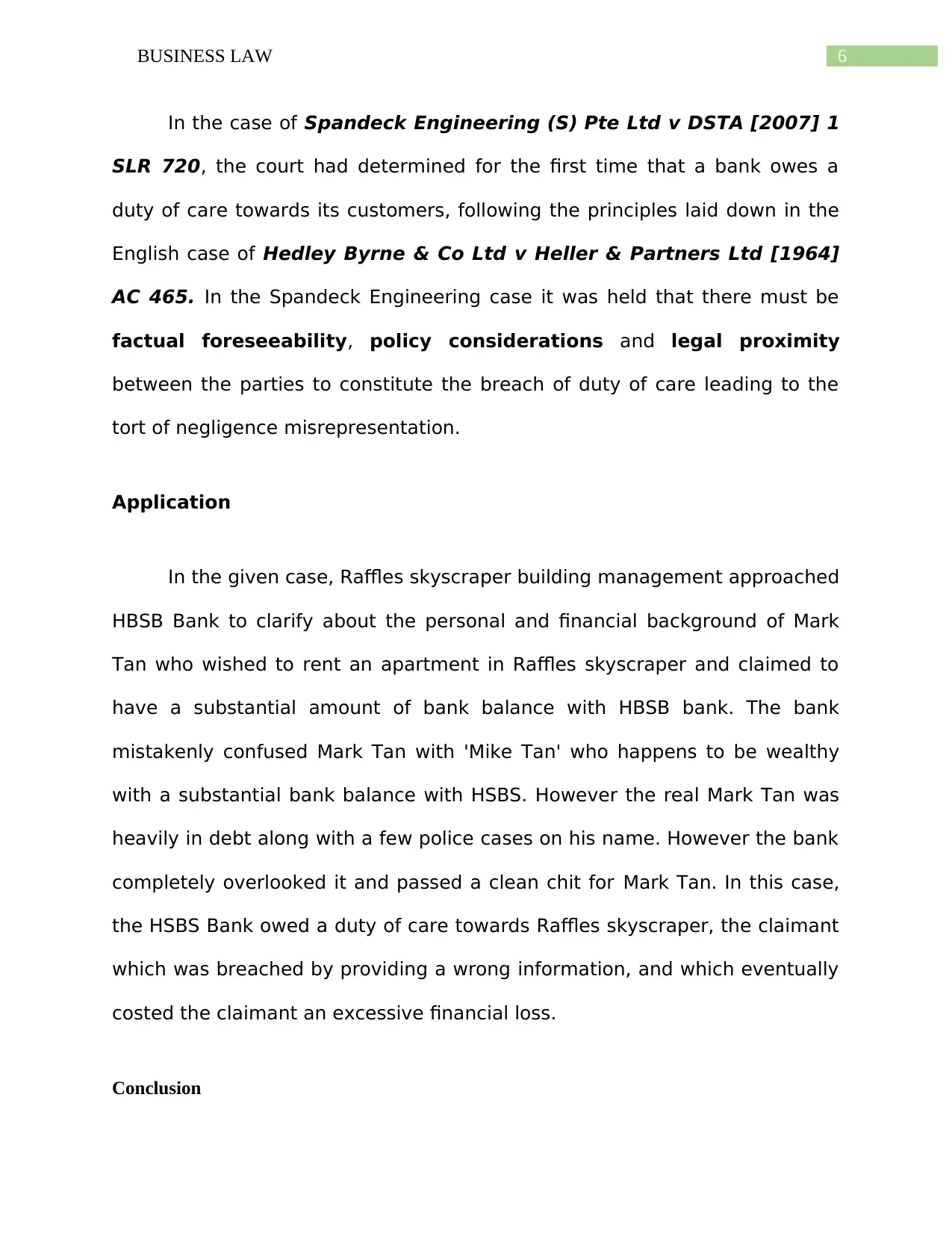
6BUSINESS LAW
In the case of Spandeck Engineering (S) Pte Ltd v DSTA [2007] 1
SLR 720, the court had determined for the first time that a bank owes a
duty of care towards its customers, following the principles laid down in the
English case of Hedley Byrne & Co Ltd v Heller & Partners Ltd [1964]
AC 465. In the Spandeck Engineering case it was held that there must be
factual foreseeability, policy considerations and legal proximity
between the parties to constitute the breach of duty of care leading to the
tort of negligence misrepresentation.
Application
In the given case, Raffles skyscraper building management approached
HBSB Bank to clarify about the personal and financial background of Mark
Tan who wished to rent an apartment in Raffles skyscraper and claimed to
have a substantial amount of bank balance with HBSB bank. The bank
mistakenly confused Mark Tan with 'Mike Tan' who happens to be wealthy
with a substantial bank balance with HSBS. However the real Mark Tan was
heavily in debt along with a few police cases on his name. However the bank
completely overlooked it and passed a clean chit for Mark Tan. In this case,
the HSBS Bank owed a duty of care towards Raffles skyscraper, the claimant
which was breached by providing a wrong information, and which eventually
costed the claimant an excessive financial loss.
Conclusion
In the case of Spandeck Engineering (S) Pte Ltd v DSTA [2007] 1
SLR 720, the court had determined for the first time that a bank owes a
duty of care towards its customers, following the principles laid down in the
English case of Hedley Byrne & Co Ltd v Heller & Partners Ltd [1964]
AC 465. In the Spandeck Engineering case it was held that there must be
factual foreseeability, policy considerations and legal proximity
between the parties to constitute the breach of duty of care leading to the
tort of negligence misrepresentation.
Application
In the given case, Raffles skyscraper building management approached
HBSB Bank to clarify about the personal and financial background of Mark
Tan who wished to rent an apartment in Raffles skyscraper and claimed to
have a substantial amount of bank balance with HBSB bank. The bank
mistakenly confused Mark Tan with 'Mike Tan' who happens to be wealthy
with a substantial bank balance with HSBS. However the real Mark Tan was
heavily in debt along with a few police cases on his name. However the bank
completely overlooked it and passed a clean chit for Mark Tan. In this case,
the HSBS Bank owed a duty of care towards Raffles skyscraper, the claimant
which was breached by providing a wrong information, and which eventually
costed the claimant an excessive financial loss.
Conclusion
Paraphrase This Document
Need a fresh take? Get an instant paraphrase of this document with our AI Paraphraser
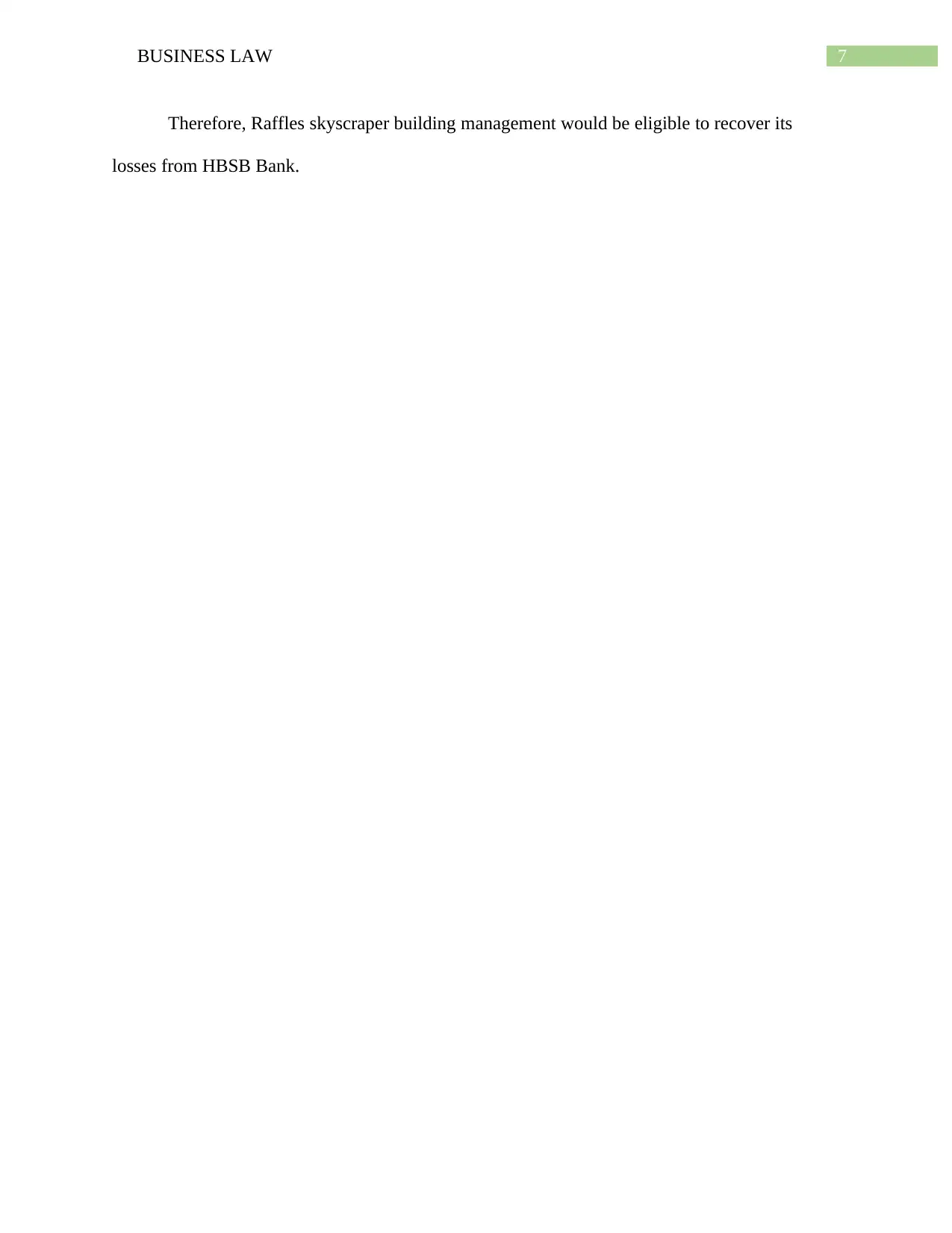
7BUSINESS LAW
Therefore, Raffles skyscraper building management would be eligible to recover its
losses from HBSB Bank.
Therefore, Raffles skyscraper building management would be eligible to recover its
losses from HBSB Bank.
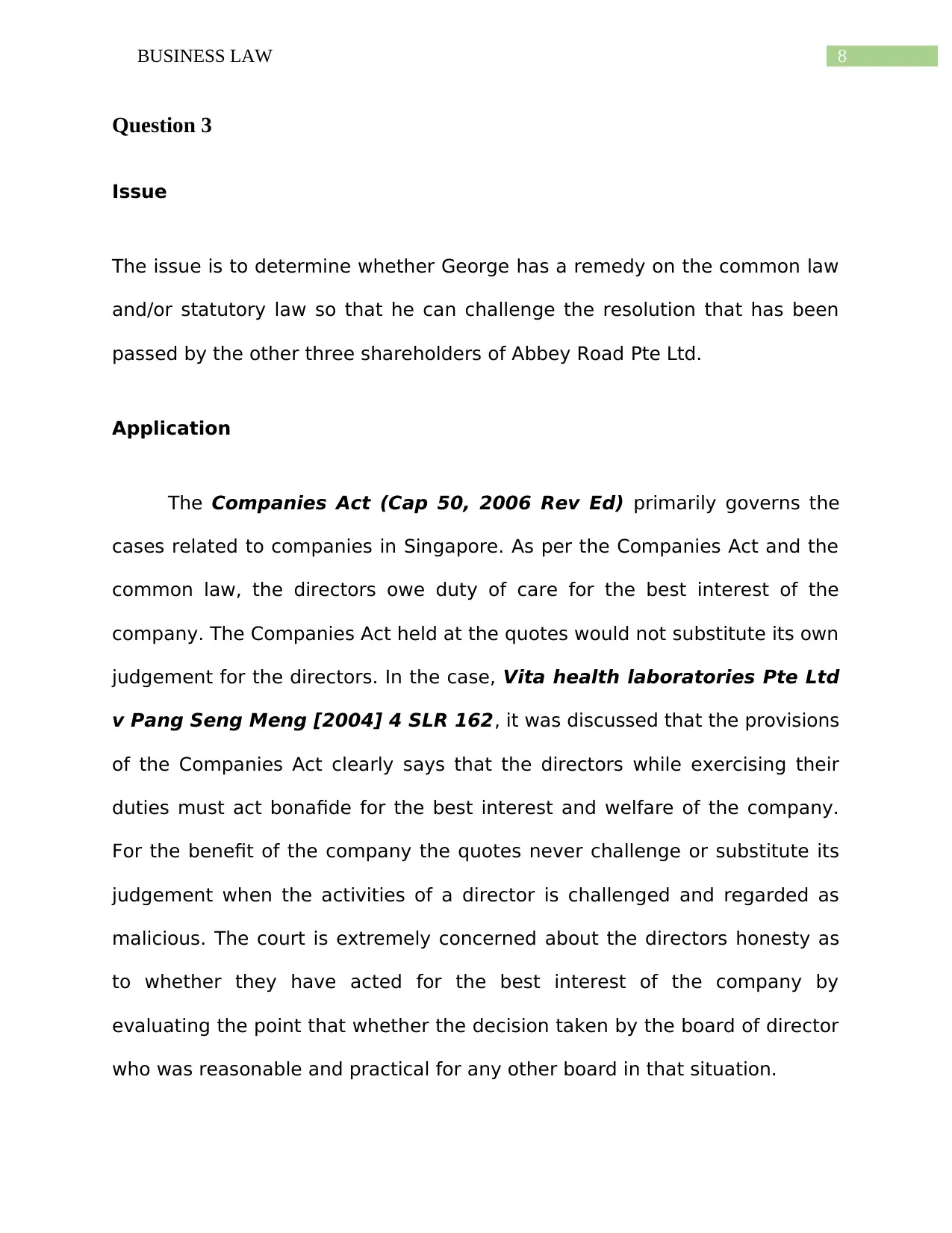
8BUSINESS LAW
Question 3
Issue
The issue is to determine whether George has a remedy on the common law
and/or statutory law so that he can challenge the resolution that has been
passed by the other three shareholders of Abbey Road Pte Ltd.
Application
The Companies Act (Cap 50, 2006 Rev Ed) primarily governs the
cases related to companies in Singapore. As per the Companies Act and the
common law, the directors owe duty of care for the best interest of the
company. The Companies Act held at the quotes would not substitute its own
judgement for the directors. In the case, Vita health laboratories Pte Ltd
v Pang Seng Meng [2004] 4 SLR 162, it was discussed that the provisions
of the Companies Act clearly says that the directors while exercising their
duties must act bonafide for the best interest and welfare of the company.
For the benefit of the company the quotes never challenge or substitute its
judgement when the activities of a director is challenged and regarded as
malicious. The court is extremely concerned about the directors honesty as
to whether they have acted for the best interest of the company by
evaluating the point that whether the decision taken by the board of director
who was reasonable and practical for any other board in that situation.
Question 3
Issue
The issue is to determine whether George has a remedy on the common law
and/or statutory law so that he can challenge the resolution that has been
passed by the other three shareholders of Abbey Road Pte Ltd.
Application
The Companies Act (Cap 50, 2006 Rev Ed) primarily governs the
cases related to companies in Singapore. As per the Companies Act and the
common law, the directors owe duty of care for the best interest of the
company. The Companies Act held at the quotes would not substitute its own
judgement for the directors. In the case, Vita health laboratories Pte Ltd
v Pang Seng Meng [2004] 4 SLR 162, it was discussed that the provisions
of the Companies Act clearly says that the directors while exercising their
duties must act bonafide for the best interest and welfare of the company.
For the benefit of the company the quotes never challenge or substitute its
judgement when the activities of a director is challenged and regarded as
malicious. The court is extremely concerned about the directors honesty as
to whether they have acted for the best interest of the company by
evaluating the point that whether the decision taken by the board of director
who was reasonable and practical for any other board in that situation.
⊘ This is a preview!⊘
Do you want full access?
Subscribe today to unlock all pages.

Trusted by 1+ million students worldwide
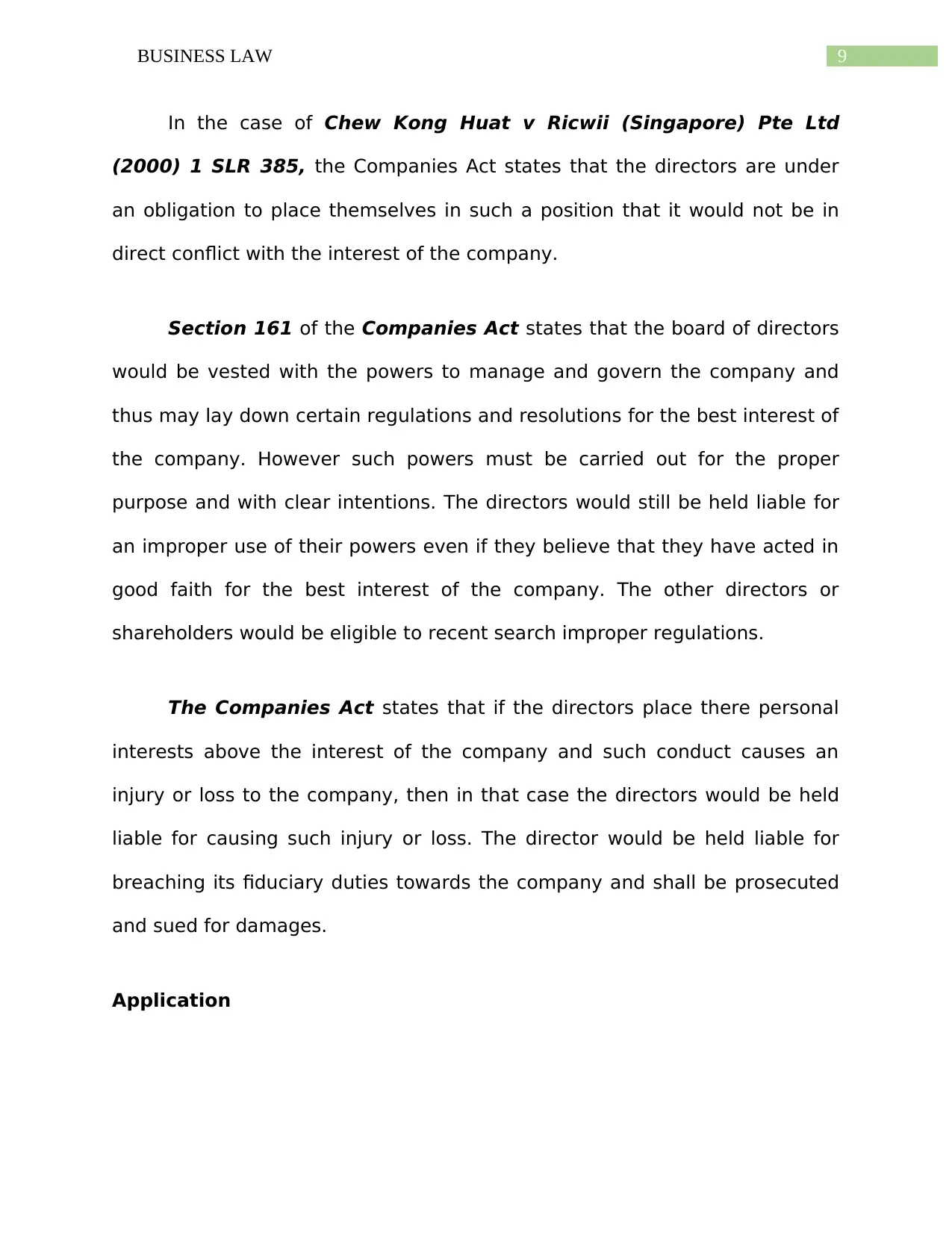
9BUSINESS LAW
In the case of Chew Kong Huat v Ricwii (Singapore) Pte Ltd
(2000) 1 SLR 385, the Companies Act states that the directors are under
an obligation to place themselves in such a position that it would not be in
direct conflict with the interest of the company.
Section 161 of the Companies Act states that the board of directors
would be vested with the powers to manage and govern the company and
thus may lay down certain regulations and resolutions for the best interest of
the company. However such powers must be carried out for the proper
purpose and with clear intentions. The directors would still be held liable for
an improper use of their powers even if they believe that they have acted in
good faith for the best interest of the company. The other directors or
shareholders would be eligible to recent search improper regulations.
The Companies Act states that if the directors place there personal
interests above the interest of the company and such conduct causes an
injury or loss to the company, then in that case the directors would be held
liable for causing such injury or loss. The director would be held liable for
breaching its fiduciary duties towards the company and shall be prosecuted
and sued for damages.
Application
In the case of Chew Kong Huat v Ricwii (Singapore) Pte Ltd
(2000) 1 SLR 385, the Companies Act states that the directors are under
an obligation to place themselves in such a position that it would not be in
direct conflict with the interest of the company.
Section 161 of the Companies Act states that the board of directors
would be vested with the powers to manage and govern the company and
thus may lay down certain regulations and resolutions for the best interest of
the company. However such powers must be carried out for the proper
purpose and with clear intentions. The directors would still be held liable for
an improper use of their powers even if they believe that they have acted in
good faith for the best interest of the company. The other directors or
shareholders would be eligible to recent search improper regulations.
The Companies Act states that if the directors place there personal
interests above the interest of the company and such conduct causes an
injury or loss to the company, then in that case the directors would be held
liable for causing such injury or loss. The director would be held liable for
breaching its fiduciary duties towards the company and shall be prosecuted
and sued for damages.
Application
Paraphrase This Document
Need a fresh take? Get an instant paraphrase of this document with our AI Paraphraser
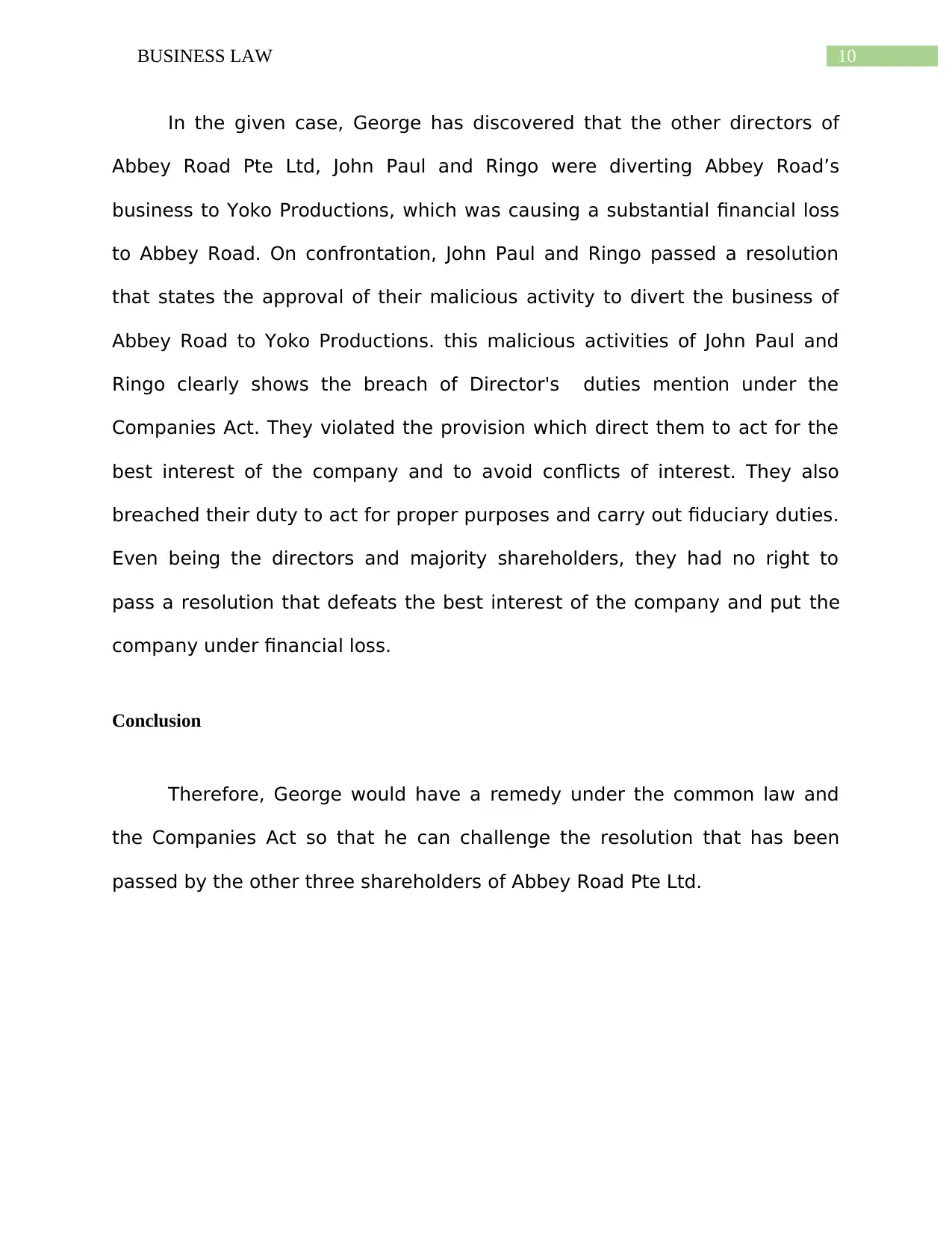
10BUSINESS LAW
In the given case, George has discovered that the other directors of
Abbey Road Pte Ltd, John Paul and Ringo were diverting Abbey Road’s
business to Yoko Productions, which was causing a substantial financial loss
to Abbey Road. On confrontation, John Paul and Ringo passed a resolution
that states the approval of their malicious activity to divert the business of
Abbey Road to Yoko Productions. this malicious activities of John Paul and
Ringo clearly shows the breach of Director's duties mention under the
Companies Act. They violated the provision which direct them to act for the
best interest of the company and to avoid conflicts of interest. They also
breached their duty to act for proper purposes and carry out fiduciary duties.
Even being the directors and majority shareholders, they had no right to
pass a resolution that defeats the best interest of the company and put the
company under financial loss.
Conclusion
Therefore, George would have a remedy under the common law and
the Companies Act so that he can challenge the resolution that has been
passed by the other three shareholders of Abbey Road Pte Ltd.
In the given case, George has discovered that the other directors of
Abbey Road Pte Ltd, John Paul and Ringo were diverting Abbey Road’s
business to Yoko Productions, which was causing a substantial financial loss
to Abbey Road. On confrontation, John Paul and Ringo passed a resolution
that states the approval of their malicious activity to divert the business of
Abbey Road to Yoko Productions. this malicious activities of John Paul and
Ringo clearly shows the breach of Director's duties mention under the
Companies Act. They violated the provision which direct them to act for the
best interest of the company and to avoid conflicts of interest. They also
breached their duty to act for proper purposes and carry out fiduciary duties.
Even being the directors and majority shareholders, they had no right to
pass a resolution that defeats the best interest of the company and put the
company under financial loss.
Conclusion
Therefore, George would have a remedy under the common law and
the Companies Act so that he can challenge the resolution that has been
passed by the other three shareholders of Abbey Road Pte Ltd.
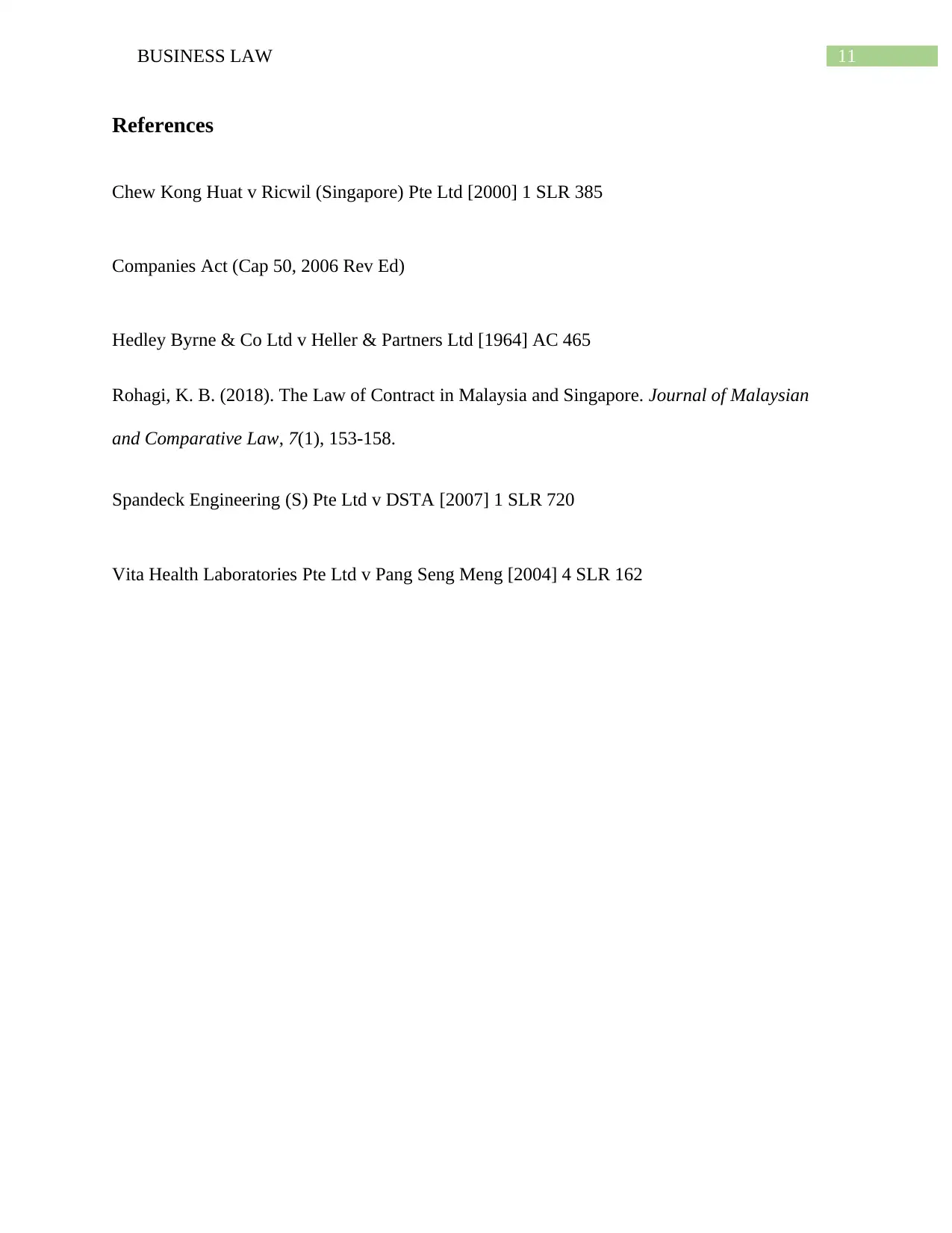
11BUSINESS LAW
References
Chew Kong Huat v Ricwil (Singapore) Pte Ltd [2000] 1 SLR 385
Companies Act (Cap 50, 2006 Rev Ed)
Hedley Byrne & Co Ltd v Heller & Partners Ltd [1964] AC 465
Rohagi, K. B. (2018). The Law of Contract in Malaysia and Singapore. Journal of Malaysian
and Comparative Law, 7(1), 153-158.
Spandeck Engineering (S) Pte Ltd v DSTA [2007] 1 SLR 720
Vita Health Laboratories Pte Ltd v Pang Seng Meng [2004] 4 SLR 162
References
Chew Kong Huat v Ricwil (Singapore) Pte Ltd [2000] 1 SLR 385
Companies Act (Cap 50, 2006 Rev Ed)
Hedley Byrne & Co Ltd v Heller & Partners Ltd [1964] AC 465
Rohagi, K. B. (2018). The Law of Contract in Malaysia and Singapore. Journal of Malaysian
and Comparative Law, 7(1), 153-158.
Spandeck Engineering (S) Pte Ltd v DSTA [2007] 1 SLR 720
Vita Health Laboratories Pte Ltd v Pang Seng Meng [2004] 4 SLR 162
⊘ This is a preview!⊘
Do you want full access?
Subscribe today to unlock all pages.

Trusted by 1+ million students worldwide
1 out of 12
Related Documents
Your All-in-One AI-Powered Toolkit for Academic Success.
+13062052269
info@desklib.com
Available 24*7 on WhatsApp / Email
![[object Object]](/_next/static/media/star-bottom.7253800d.svg)
Unlock your academic potential
Copyright © 2020–2026 A2Z Services. All Rights Reserved. Developed and managed by ZUCOL.





